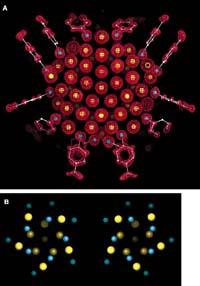Structure of gold nanoparticles

When gold is used in laboratories, it is used in very small quantities, in powder form; some gold nanoparticles are sufficient to be used experimentally. Gold is typical for multiple applications, although the exact structure of these conventional gold nanoparticles was not known. For this reason, researchers at the University of Stanford have created a crystal of these nanoparticles and analyzed it using X-rays: 102 are particles of 102 golden atoms, have the same organization as atoms in metallic gold and are surrounded by 44 molecules containing sulfur.
Sulphur molecules are added to gold to prevent the binding of nanoparticles, forming a protective layer around the gold. This study has clarified the nature of this layer, which will contribute to the development of a chemical interaction model of the entire gold nanoparticle. This model will be useful not only in laboratory work, but also in the study of the toxicity of gold.





